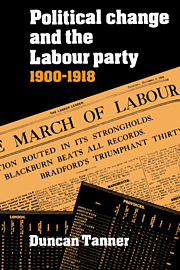Book contents
- Frontmatter
- Contents
- List of tables
- Preface
- Abbreviations
- Introduction
- PART I POLITICS AT THE CENTRE
- PART II POLITICS IN THE CONSTITUENCIES
- PART III AN INTEGRATED PICTURE
- PART IV THE POLITICS OF CHANGE
- 12 Industry, politics and the Progressive Alliance, 1914–1918
- 13 The end of the Progressive Alliance
- CONCLUSION
- APPENDICES
- Bibliography
- Index
12 - Industry, politics and the Progressive Alliance, 1914–1918
Published online by Cambridge University Press: 24 October 2009
- Frontmatter
- Contents
- List of tables
- Preface
- Abbreviations
- Introduction
- PART I POLITICS AT THE CENTRE
- PART II POLITICS IN THE CONSTITUENCIES
- PART III AN INTEGRATED PICTURE
- PART IV THE POLITICS OF CHANGE
- 12 Industry, politics and the Progressive Alliance, 1914–1918
- 13 The end of the Progressive Alliance
- CONCLUSION
- APPENDICES
- Bibliography
- Index
Summary
It is commonly assumed that the First World War caused considerable social and political upheaval. Changes in the industrial sphere and a compression of the class structure are generally identified as the major causes of a change in Labour's strength and position. In reality, while there were some changes, there was not a complete rupture with the past. Social and economic conditions did not create a homogeneous working class, or a uniform class experience (Section I). Workers were not discontented with an oppressive state (as some Marxist historians would have us believe). They did not display a sense of oppositional class unity. Neither did participation in the war effort transform the British working class (Section II).
Nonetheless, there was the potential for social/political discontent during the war, and parties could not afford to let their political position slip. Labour attempted to maximise its prospects by supporting the military and industrial changes which Governments argued were necessary to win the war, while insisting at the same time that these changes should not adversely affect domestic living standards and liberties. Many Labour proposals for the home front reflected traditional Liberal concerns. However, while Labour's support for the provision of public housing, and its concern that the burden of war should fall on the rich were ‘moral’ issues which built on pre-war (Liberal) campaigns for economic justice, it had developed concrete proposals (nationalisation, the capital levy) which improved its credibility as a reforming party.
- Type
- Chapter
- Information
- Political Change and the Labour Party 1900–1918 , pp. 351 - 383Publisher: Cambridge University PressPrint publication year: 1990
- 1
- Cited by



